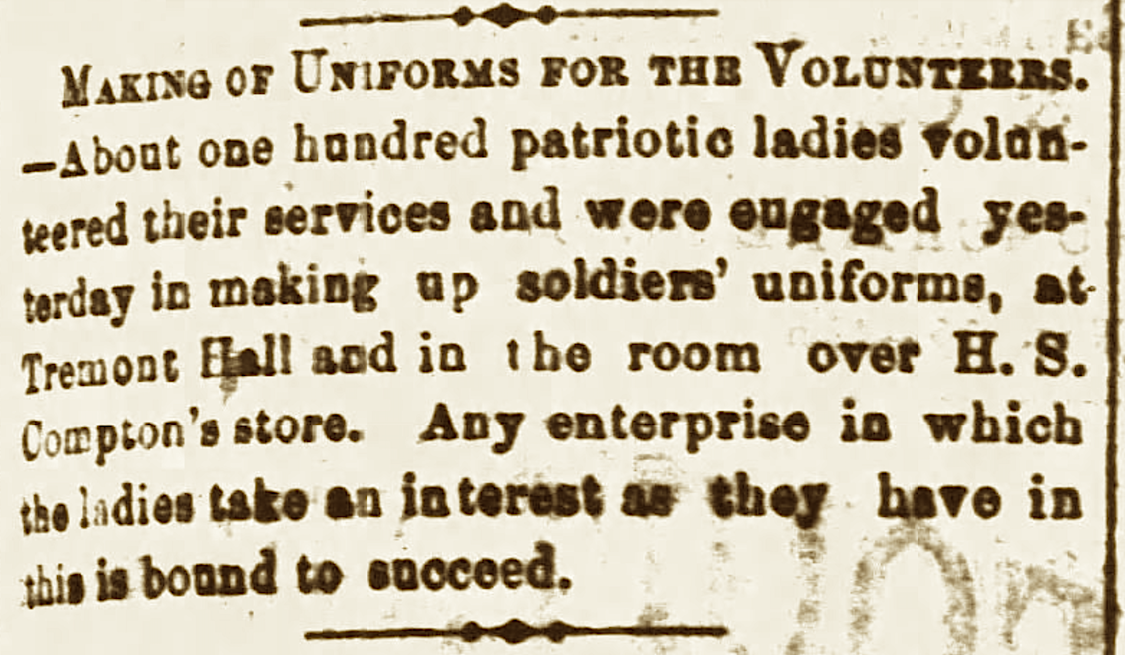
Muscatine Daily Journal • Saturday, April 27, 1861.
This column by Daniel G. Clark about Alexander Clark (1826-1891) first appeared in the Muscatine Journal on May 24, 2023.
Muscatine volunteers fought in the first major Civil War battle west of the Mississippi, at Wilson’s Creek in southwest Missouri, August 10, 1861.
Outnumbered Union troops lost, and Gen. Nathaniel Lyon was killed, but the federal show of force is credited with keeping Missouri a neutral border state.
Muscatine Journal, August 16, 1878: “Iowa’s first regiment of infantry bore a conspicuous part and there won the laurels which other Iowa regiments never allowed to become tarnished. It was on that bloody field that the first Iowa soldier was slain, Shelby Norman, of Co. A, being the first one killed by a rebel bullet piercing his brain. … A few of those gallant boys are still with us….”
One of them was Robert Baird, usually known as “R.B.”
In 1862, back from his short enlistment, R.B. married Elizabeth Hill. She was a niece of Col. Sylvester G. Hill who was then organizing the 35th Iowa Infantry in Muscatine and Cedar counties. He enlisted and served until war’s end, eventually as quartermaster.
I ran across R.B. Baird while researching Tremont Hall—where orators including Frederick Douglass spoke, where Alexander Clark’s funeral was held. By then the librarian of the Congregational Sunday school and custodian at Musser Public Library, he’d presented a paper to the Old Settlers.
From Baird’s “Reminiscences of Tremont Hall,” Muscatine News-Tribune, August 30, 1903: “It was here that the first companies for the war were enlisted and drilled. Here were made the uniforms, jacket and trousers, for the first two companies Muscatine sent to the front, Cos. A and C, Iowa first infantry. Here the loyal women worked day and night and Sunday too to help the work along. The hall was, it might be said, never closed during the war. It was an arsenal, quartermaster, commissary and medical depot with a diet kitchen attached. Here the Soldiers’ Aid Society organized and worked.… They took care of the sick and wounded soldiers, assisted their wives and families, gave public receptions to the 7th, 11th, 16th and 35th regiments Iowa infantry and Second Iowa cavalry. … All honor to the members of that society. Their ranks are thinning fast, more so than those of the boys in blue.”
Reports from April and May 1861 tell of those women making uniforms in Tremont Hall. The more evocative recollection, however, comes from Baird much later.
Muscatine Journal, May 31, 1909: “Another great work done by the loyal women of this city, was the making of the uniforms for Companies A and C of the First lowa infantry. Neither the general government or the state could furnish a uniform, so a committee was sent to Chicago to buy the cloth for jackets and trousers. Rev. Dr. A.B. Robbins was one of that number. Seventy-five women and girls assembled in Tremont Hall…and a number of sewing machines were kept humming. Tailors cut and women sewed until the last button was fastened on. ‘What hopes and fears were stitched into those uniforms—every thread was a prayer.’”
I looked for earlier writing and found a letter published in the Journal, June 26, 1863, wherein Baird credits Black soldiers with saving the day in a ferocious battle at Milliken’s Bend, La.
“It has been proved to my entire satisfaction that a negro can keep himself and his family, and now [the battle] proves what I always believed, that they will fight, and fight as hard, as faithful and as true as white men.”
News items over the years associate Baird with Clark and Robbins and others I’ve introduced in this column. He served for a time as postmaster of the legislature in Des Moines, and as county chairman of the Republican Party.
In 1878 Baird and Clark were among the eight Muscatine delegates to Republican state convention.
Mostly I found R.B. serving fellow war veterans. From 1872 onward he was among the organizers of Decoration Day, later Memorial Day. He was elected commander of the G.A.R. post in 1909 and reelected in 1910.
He announced a First Iowa reunion would be held August 10, 1910, at “their old stamping grounds” in Weed Park. “All old soldiers are invited with their wives.”
Muscatine News-Tribune, August 19, 1910: “Robert Baldwin Baird, the beloved commander of the Shelby Norman Post, Grand Army of the Republic, is no more. The last roll sounded for him last evening at 9:30 o’clock.”
A recent mention in a West Hill historic-preservation survey: “Despite being described in his 1910 obituary as one of Muscatine’s most prominent soldiers and citizens, Robert Baird does not appear to have substantially influenced the history of the community.”
Memory fades.
* * *
Tribute to Anthony Brown’s legacy of music and work for justice and peace: https://youtu.be/h3ylJQgKfSA. Tony was a dear friend who presented a 2022 Jackson Concert in cooperation with the Alexander Clark cultural series.
Next time: Alexander Clark does RAGBRAI?

1 Comment
I will remember Robert Baird...
…and I’m sure some other readers will too. Thank you, Daniel G. Clark.
PrairieFan Tue 2 Jan 10:16 PM